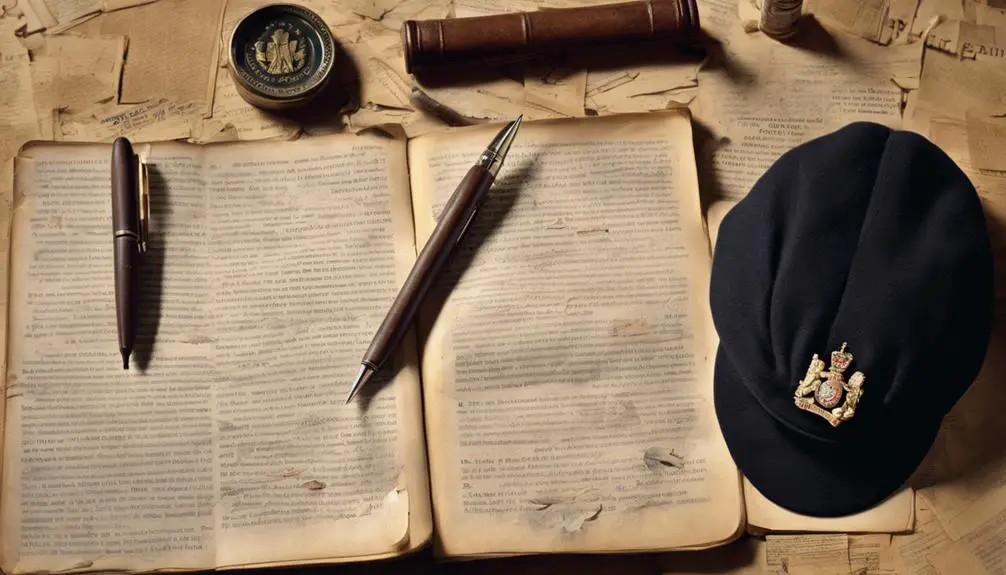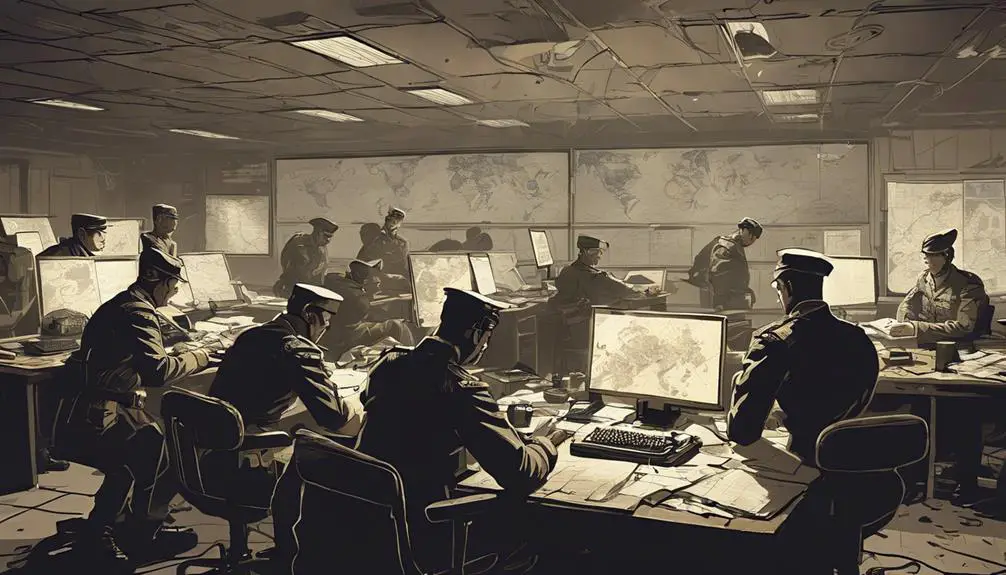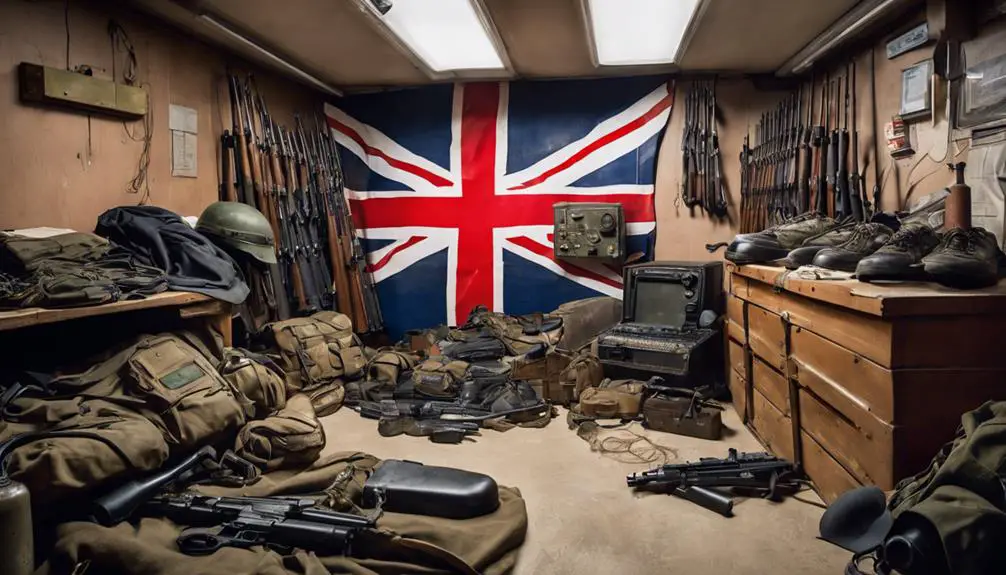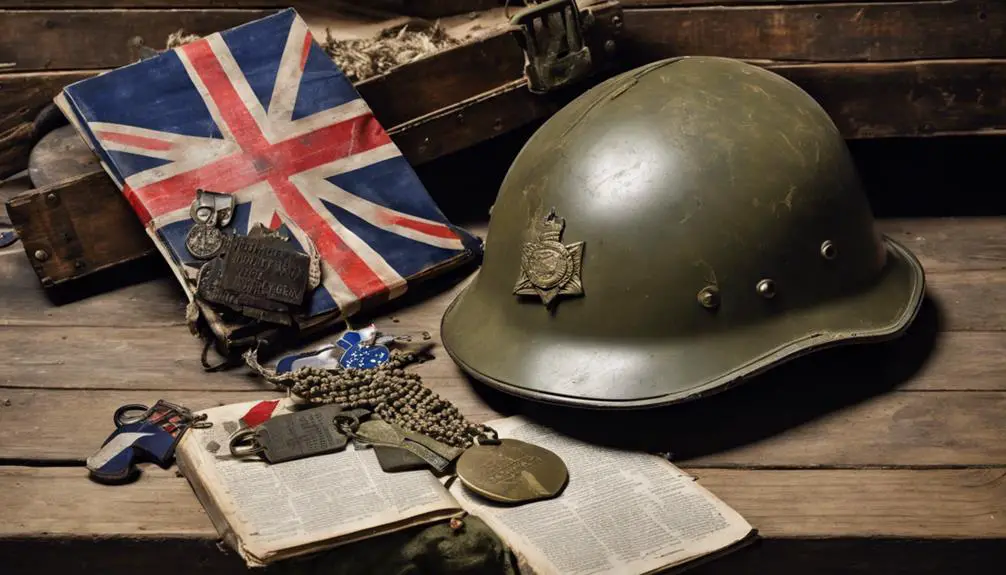You're about to immerse yourself in the unique language of the British military. From 'sort yourself out' (get your act together) to 'muck in' (lend a hand), mastering essential slang helps you build relationships and thrive in barrack life. In the mess hall, you'll hear 'scran time' (mealtime) and 'brew break' (tea or coffee time). As you progress, you'll learn military jargon for operations, emotions, equipment, and ranks. Understanding these terms enhances communication and collaboration. Now, dive deeper into the world of British military slang, and discover the nuances that'll help you thrive in this unique environment.
Essential Slang for New Recruits

As you step into the British military, you'll quickly realize that familiarizing yourself with essential slang is important to getting through everyday conversations with your comrades. Barrack life can be overwhelming, but knowing the right phrases can help you fit in and build strong relationships with your squad.
For instance, when someone says 'sort yourself out,' they're telling you to get your act together. If someone asks you to 'muck in,' they're asking for your help. Understanding these phrases can help you navigate everyday situations and achieve your squad goals.
In the barracks, you'll often hear 'crack on' used to urge someone to hurry up or get moving. If someone says 'chin wag,' they're referring to a casual chat or gossip session. Knowing these phrases can help you build camaraderie with your fellow recruits and make the adjustment to military life smoother.
Army Lingo for Food and Drink
You'll soon discover that mealtimes in the British military have their own language, with phrases like 'scran' and 'brew' becoming an integral part of your daily routine.
As a new recruit, learning these food and drink-related slang terms will help you navigate mealtime conversations with ease. Here are some essential phrases to get you started:
- Scran Time: Refers to mealtime, where you'll gather with your squad to refuel and recharge.
- Brew Break: A short break to grab a hot cup of tea or coffee, providing a much-needed energy boost.
- Scran: Food, whether it's a hearty breakfast, a packed lunch, or a warm dinner.
- Gutted: Not just a phrase for being disappointed, but also used to describe being extremely hungry – 'I'm well gutted, when's scran time?'
Mastering these terms will help you blend in with your fellow soldiers and make mealtime conversations more enjoyable.
Military Jargon for Operations

Operating in the British military requires understanding a unique set of operational terms that facilitate clear communication and efficient execution of tasks. You'll need to familiarize yourself with these terms to effectively work alongside your comrades.
One critical term is Op Order, short for Operational Order. This is a detailed plan outlining the mission objectives, timelines, and resources allocated. You'll receive an Op Order before starting on an operation, so it's vital to understand the terminology and abbreviations used.
Another vital term is Sit Rep, short for Situation Report. This is a concise update on the current operational status, highlighting successes, challenges, and changes. You'll need to provide accurate and timely Sit Reps to make sure your superiors have an accurate picture of the situation.
Understanding these terms will enable you to communicate effectively, execute tasks efficiently, and contribute to the success of the operation. By mastering military jargon for operations, you'll become a valuable asset to your unit and enhance overall mission effectiveness.
Slang for Emotions and Injuries
During high-pressure missions, soldiers often rely on colloquialisms to express emotions and describe injuries, allowing them to quickly convey complex information without compromising operational security. As you navigate the complexities of military communication, understanding slang for emotions and injuries is vital.
You'll often hear soldiers describe their mental state using terms like 'cracked' or 'bogged' to convey feelings of exhaustion or frustration. When it comes to physical injuries, soldiers might receive a 'Wound Badge' to recognize their sacrifice. However, if the injury is psychological, they might be diagnosed with 'Battle Fatigue,' a condition characterized by extreme stress and anxiety.
Here are some essential slang terms to know:
- 'Gutted' – extremely disappointed or upset
- 'Mullered' – extremely tired or exhausted
- 'Dinged' – lightly injured or wounded
- 'Medevac' – medical evacuation, often used to transport injured soldiers to a medical facility
Military Slang for Equipment

Mastering military slang for equipment is crucial, as it allows you to swiftly identify and communicate gear-related issues, guaranteeing seamless collaboration and effective mission execution. Familiarizing yourself with gear names and tech specs can greatly enhance your operational efficiency.
For instance, knowing that a 'Basha' refers to a tent or a 'Sangar' means a fortified emplacement, can facilitate rapid setup and deployment. Similarly, understanding that a 'GPMG' denotes a General Purpose Machine Gun or a 'Spike' refers to an anti-tank missile, can ensure accurate communication during critical operations.
Being well-versed in military slang for equipment also enables you to quickly troubleshoot technical issues. For example, if you're experiencing problems with your 'Clansman' radio, you can promptly identify the issue and coordinate repairs. Additionally, having a solid grasp of tech specs can help you optimize equipment performance, ensuring that your gear operates at peak efficiency.
Colloquialisms for Ranks and Roles
As you move beyond equipment terminology, you'll find that colloquialisms for ranks and roles are equally important for effective communication and efficient teamwork. In the British military, colloquialisms for ranks and roles serve as a way to build camaraderie and simplify communication. These colloquialisms, often referred to as Rank Nicknames or Officer Monikers, are an essential part of military slang.
Here are some examples of colloquialisms for ranks and roles:
- *Sarge* or *Sarg* for Sergeant
- *Boss* or *Guv* for Officer or Senior Non-Commissioned Officer (SNCO)
- *Rup* for Lieutenant
- *Chief* for Chief Petty Officer (CPO) or Warrant Officer (WO)
Using these colloquialisms can help you navigate the complexities of military hierarchy and build stronger relationships with your comrades.
Frequently Asked Questions
What Is the Origin of British Military Slang?
As you explore the origin of military slang, you'll discover it's rooted in historical roots and shaped by cultural influences.
You'll find that soldiers, throughout history, have crafted their own language to cope with the harsh realities of war. This unique dialect emerged as a response to the need for secrecy, camaraderie, and humor in the face of adversity.
Is British Military Slang Used by All Branches of the Military?
You might be surprised to know that 75% of military personnel use slang in their daily communication.
As you ponder whether British military slang is utilized by all branches of the military, let's delve into it. While the Army has its own jargon, the Navy has its distinct lingo. Although there's some overlap, each branch has its unique slang, reflecting their distinct cultures and histories.
You'll find that while there's no single, universal slang, certain terms do transcend branch boundaries.
Are There Any Regional Differences in British Military Slang?
As you explore the world of military slang, you'll notice that regional differences play a significant role in shaping the language.
Geographic variations across the UK lead to distinct dialectical divides, influencing the slang used by military personnel.
For instance, Scottish troops may use different expressions than their English counterparts.
You'll find that regional accents and cultural backgrounds contribute to these differences, making British military slang a rich and diverse phenomenon.
How Does British Military Slang Compare to American Military Slang?
As you explore the world of military slang, you'll find that British and American slang have distinct styles. The Slang Evolution in both countries has been shaped by cultural and historical events, resulting in unique lexical differences.
Transatlantic variations in pronunciation, vocabulary, and idioms create language barriers that can impede communication. Understanding these differences is essential to avoid misunderstandings.
Is British Military Slang Still Used in Modern Military Operations?
As you explore modern military operations, you'll find that British military slang still holds operational relevance. Its cultural significance endures, fostering camaraderie and shared identity among troops.
Though formal communication prevails, slang slips into informal chats, easing tensions and boosting morale. In high-pressure situations, familiar phrases provide comfort, reassurance, and a sense of continuity.
Conclusion
As you trade in civvies for combats, you'll need to learn the lingo to avoid getting lost in translation. You've now got a grip on the essential slang, from 'scran' to 'Serial' and 'crash out' to 'Oscar Mike'.
But remember, in the British military, it's not just about talking the talk – it's about walking the walk. So, get out there and put your new vocabulary to the test, and don't get 'mullered' on your first op.







